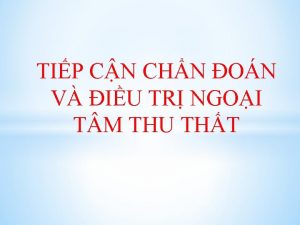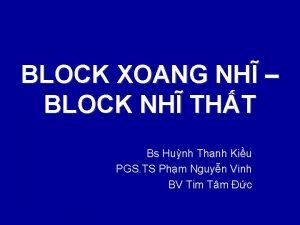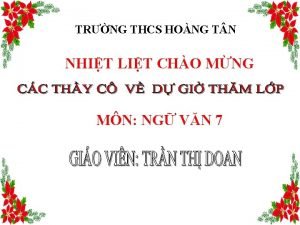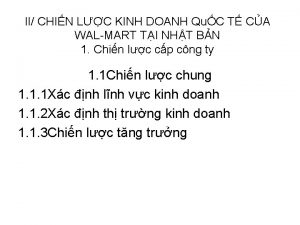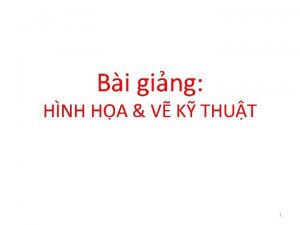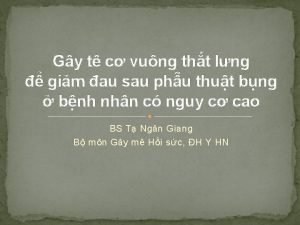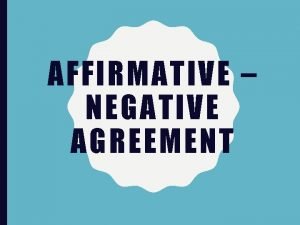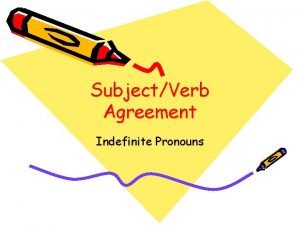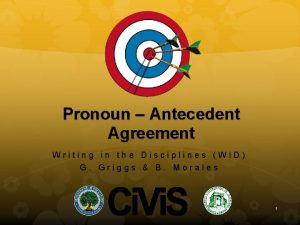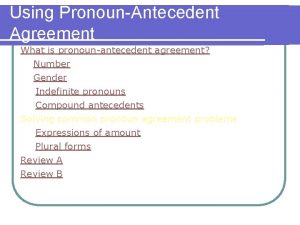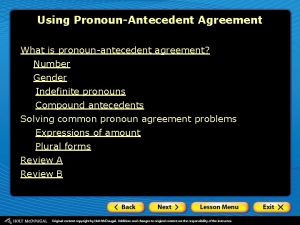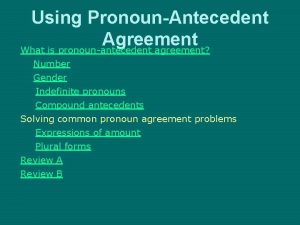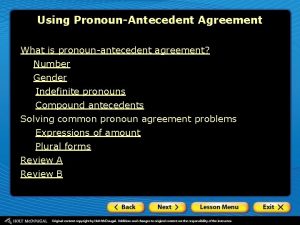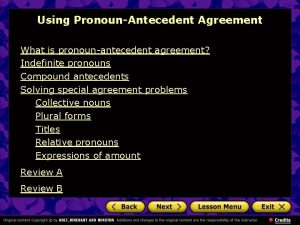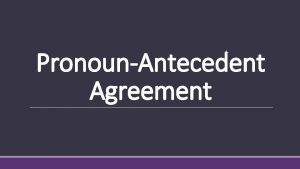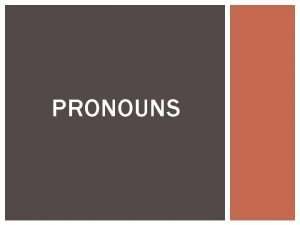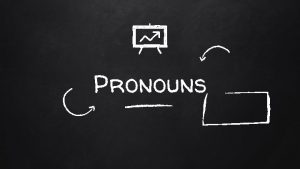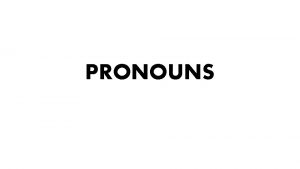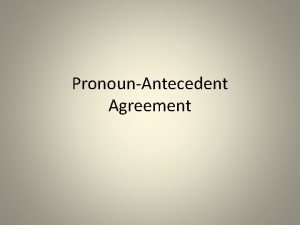PronounAntecedent Agreement Pronouns words that are used in













- Slides: 13

Pronoun-Antecedent Agreement Pronouns: words that are used in place of one or more nouns or pronouns Examples: Ask Dan if Dan has done Dan’s homework Ask Dan if he has done his homework. Both of Sally's friends said both would help Lois to find Lois’s books. Both of Sally's friends said they would help Lois find her books.

Pronoun-Antecedent Agreement The word that a pronoun stands for (or refers to) is called its antecedent. ante (before) + cede (to come) = antecedent (that which comes before) • Antecedents are nouns (or sometimes pronouns) in the sentence. • Antecedents usually come before the pronoun in the same sentence. • Antecedents sometimes appear in the sentence just before the one with the pronoun. Example: antecedent pronoun Frederick, have you turned in your report?

Pronoun-Antecedent Agreement A personal pronoun MUST agree with its antecedent in number and gender.

Pronoun-Antecedent Agreement

Pronoun-Antecedent Agreement RULES (1) Use a singular pronoun to refer to two or more singular antecedents joined by or. EXAMPLES: • Either Ralph or Carlos will display his baseball card collection. • Nina or Mary will bring her CD player.

Pronoun-Antecedent Agreement RULES (2) Use a plural pronoun to refer to two or more antecedents joined by and. EXAMPLES: • Isaac and Jerome went to the playground so that they could practice shooting baskets. • Elena and Roberto sent letters to their cousin in Costa Rica.

Pronoun-Antecedent Agreement Guided Practice GENDER (1. ) Carlotta said that she found her book. (2. ) Aaron brought his skates with him.

Pronoun-Antecedent Agreement Guided Practice GENDER (3) The plant with mold on it is losing its leaves.

Pronoun-Antecedent Agreement Guided Practice GENDER (4) Every one of the parents praised his or her child's efforts. (5. ) No one in the play forgot his or her lines. -one, -body, -thing. . each, either, neither SINGULAR!!

Pronoun-Antecedent Agreement Guided Practice Agreement: (6. ) Someone in the class left behind his or her pencil. (7. ) Each of the snakes escaped from its cage.

Pronoun-Antecedent Agreement Guided Practice Agreement: (8. ) Either Ralph or Carlos will display his baseball collection. (9. ) Nina or Mary will bring her CD player. (10. ) Odessa or Raymond will bring his or her road map.

Pronoun-Antecedent Agreement Guided Practice Agreement: (11. ) Isaac and Jerome went to the playground so that they could practice shooting baskets. (12. ) Elena and Roberto sent letters to their cousins in Costa Rica.

Pronoun-Antecedent Agreement Guided Practice Agreement: (13. ) The cast is giving its final performance. (Neutral ; Singular) (14. ) The cast is trying on their costumes. (Neutral ; Plural) (15. ) Everyone is giving his or her opinion.
 Antigentest åre
Antigentest åre Phân độ lown ngoại tâm thu
Phân độ lown ngoại tâm thu Block xoang nhĩ độ 2
Block xoang nhĩ độ 2 Thể thơ truyền thống
Thể thơ truyền thống Thơ thất ngôn tứ tuyệt đường luật
Thơ thất ngôn tứ tuyệt đường luật Chiến lược kinh doanh quốc tế của walmart
Chiến lược kinh doanh quốc tế của walmart Tìm độ lớn thật của tam giác abc
Tìm độ lớn thật của tam giác abc Hãy nói thật ít để làm được nhiều
Hãy nói thật ít để làm được nhiều Tôn thất thuyết là ai
Tôn thất thuyết là ai Gây tê cơ vuông thắt lưng
Gây tê cơ vuông thắt lưng Sau thất bại ở hồ điển triệt
Sau thất bại ở hồ điển triệt Positive negative agreement
Positive negative agreement Indefinite pronouns subject verb agreement
Indefinite pronouns subject verb agreement Agreement with generic nouns and indefinite pronouns
Agreement with generic nouns and indefinite pronouns

